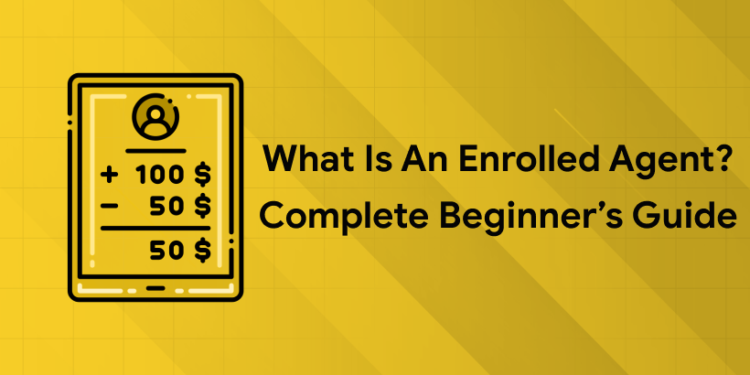Table of Contents
Key Takeaways:
- An Enrolled Agent (EA) is a federally licensed tax expert authorized to represent taxpayers before the IRS.
- EAs pass a rigorous three-part exam or qualify through IRS work experience.
- The credential provides unlimited practice rights nationwide for tax representation.
- Becoming an EA opens diverse career opportunities in tax advisory and representation.
- Entri’s Enrolled Agent course in Kerala offers expert-led, flexible training for aspiring EAs.
Introduction
Filing taxes, navigating audits, and resolving IRS disputes can be complex and stressful for individuals and businesses alike. Imagine having a dedicated professional with official authorization to represent you before the IRS, guide you through tax laws, and help maximize your tax outcomes. This professional is an Enrolled Agent (EA), a specialized credentialed expert whose authority is federally granted by the U.S. Department of Treasury.
Whether you’re a recent graduate, finance professional, or someone looking for a stable, high-demand career, becoming an Enrolled Agent offers a meaningful way to build expertise in tax matters with excellent earning potential. This guide demystifies the EA role, the path to certification, career prospects, and tips on how to succeed in this growing profession.
What Is an Enrolled Agent (EA)?
1: Accounting provides information on
An Enrolled Agent (EA) is a tax professional licensed by the U.S. federal government through the IRS (Internal Revenue Service). Unlike CPA (Certified Public Accountant) or other tax preparers who may have state-specific licenses, EAs have the authority to practice across the entire United States.
EAs are experts in handling all sorts of tax matters, including preparing taxes, offering advice on tax planning, and representing clients during audits, collections, or appeals. Their license is issued after passing a comprehensive exam or through prior IRS employment, making them one of the most credentialed tax professionals.
The role of an EA is vital because they offer an authoritative voice in tax disputes, have unlimited practice rights—which means they can represent any taxpayer, and are recognized for their specialized knowledge in tax laws and ethics. Many businesses and individual taxpayers seek out EAs to ensure they comply with the complex U.S. tax rules and to get the best possible tax outcomes.
Placement Oriented PWC Business Accounting Course
PWC Certified Business Accounting Course by Entri App: Master in-demand skills, ace interviews, and secure top-tier jobs.
Join Now!Why Become an Enrolled Agent?
Choosing to become an Enrolled Agent is a strategic career decision with many compelling benefits. First and foremost, EAs have unlimited practice rights, allowing them to represent clients on all tax issues anywhere in the U.S., whether it’s audits, collections, or appeals. They are trusted professionals with a recognized credential, which instantly builds credibility among clients.
As tax laws become increasingly complex, the demand for qualified tax experts continues to grow. EAs are especially valuable in outsourcing markets like India, where many firms now offer U.S. tax preparation and representation services.
Further advantages include:
- Stable and lucrative career: EAs often command attractive salaries and have opportunities for growth.
- Flexibility: They can work independently, join established firms, or even start their own practice.
- Career diversification: EAs can specialize in areas like international tax, estate planning, or tax resolution.
- Recognition and Respect: The EA credential attests to profound knowledge and adherence to ethical standards.
Overall, becoming an EA means stepping into a respected and expanding niche in the finance and taxation world, with ample opportunities for both professional development and personal fulfillment.
Read in detail the Top 10 Reasons to Become an Enrolled Agent
EA Exam: Structure and Preparation Tips
The pathway to earning the Enrolled Agent credential involves passing the Special Enrollment Examination (SEE), a comprehensive three-part exam designed to test your knowledge and skills across key areas of tax practice.
Structure of the Exam
- The exam comprises three separate parts, each with 100 multiple-choice questions:
- Part 1: Individuals – Focuses on tax issues related to individuals, including income, deductions, credits, and filing requirements.
- Part 2: Businesses – Covers tax procedures for different business entities like corporations, partnerships, and sole proprietors.
- Part 3: Representation, Practice & Procedures – Tests knowledge of IRS collections, audits, ethics, and procedural rules.
- Candidates have 3.5 hours to complete each part.
- A score of 105 out of 130 is required to pass each section.
Tips for Success
- Start with the IRS resources: Use the official IRS Candidate Bulletins and study guides to understand exam scope.
- Use practice exams regularly to familiarize yourself with the question format and time constraints.
- Enroll in dedicated training courses: Many online platforms, including Entri, offer comprehensive courses tailored for the EA exam.
- Focus on the representation section: Ethics, IRS procedures, and client advocacy are crucial and often challenging parts.
- Create a study schedule: Break down the syllabus into manageable parts and set weekly goals.
- Join study groups or forums: Interacting with peers can boost motivation and clarify doubts.
Successfully clearing the exam category-wise enhances your confidence and prepares you for a fulfilling career as a fully licensed IRS practice professional.
Eligibility and Course Duration
- Minimum Age: You must be at least 18 years old.
- Educational Background: No specific degree or qualification is required to pursue the EA license, making it highly accessible to a broad range of aspirants. Candidates typically need to have completed at least high school (12th grade) or the equivalent.
- Preparer Tax Identification Number (PTIN): Before applying to take the EA exam or start work, you must obtain a PTIN from the IRS, which is a mandatory identification for tax preparers.
- Background Check: A suitability review is conducted by the IRS, which includes checks for criminal convictions (especially related to dishonesty or financial fraud) and tax compliance. Individuals with felony convictions related to dishonesty or breach of trust within the last ten years may face disqualification.
- Experience Pathway: Alternatively, candidates with at least five years of IRS employment involving tax law interpretation and application in roles such as revenue agents or tax examiners can qualify without passing the exam.
Course Duration:
- Most candidates take approximately 3 to 6 months of dedicated study to prepare thoroughly for all three parts of the exam, depending on their familiarity with tax laws and personal commitments.
- Many online courses, including Entri’s, are designed to be flexible and self-paced, allowing learners to complete materials at their convenience.
Read in detail: How To Become an Enrolled Agent in India: Step-by-Step Guide
Placement Oriented PWC Business Accounting Course
PWC Certified Business Accounting Course by Entri App: Master in-demand skills, ace interviews, and secure top-tier jobs.
Join Now!Career Scope and Opportunities
- Tax Preparation and Planning: Many EAs work for accounting firms, tax consulting companies, or as independent practitioners preparing and filing tax returns for individuals and businesses.
- Representation Before the IRS: As experts in tax law, EAs represent clients in audits, appeals, and collection matters, making this a vital role in the tax ecosystem.
- Specializations: EAs can develop expertise in niche areas like international taxation, estate and trust tax, payroll, or cryptocurrency taxation, which increases marketability.
- Corporate Roles: Many multinational companies and financial institutions employ EAs for their tax compliance, strategy, and advisory needs.
- Entrepreneurship: With the right experience, many EAs start their own tax consultancy, providing services locally or globally.
- Remote Work and Outsourcing: Indian EAs and tax professionals work with U.S.-based clients through outsourcing firms, gaining competitive salaries depending on experience.
Job Market Outlook (2025):
- The demand for qualified tax professionals, including EAs, remains strong due to increasing IRS enforcement, evolving tax laws, and the global expansion of U.S. tax obligations.
- The U.S. government also projects a steady increase in the need for practitioners who can represent taxpayers efficiently and ethically.
- For Indian professionals, the rise of cross-border taxation work presents significant opportunities in multi-national firms, with salaries rising correspondingly.
Also read: Top Companies Hiring Enrolled Agents in India
Salary Details of Enrolled Agents in 2025
| Experience Level | India Salary (INR per annum) | U.S. Salary (USD per annum) | Description |
|---|---|---|---|
| Entry-Level | ₹3,50,000 – ₹6,00,000 | $48,000 – $55,000 | Freshly credentialed, basic tax preparer roles |
| Mid-Level | ₹8,00,000 – ₹12,00,000 | $55,000 – $75,000 | Experienced with client representation and specialized skills |
| Senior-Level | ₹15,00,000 – ₹25,00,000+ | $75,000 – $100,000+ | Senior roles, managing teams or own tax practice |
- Salaries depend on location, employer (Big Four firms pay higher), and specialization (international tax, audit defense).
- U.S. salaries reflect cost of living adjustments and market demand variance by state.
- Indian professionals working with multinational corporations or outsourcing groups tend to earn top salaries.
Read in detail: Enrolled Agent Salary in India
Entri’s Enrolled Agent Course
Aspiring Enrolled Agents in Kerala and beyond can benefit from Entri’s Enrolled Agent course, tailored for learners seeking a comprehensive, flexible program. Entri offers:
- Detailed coverage of all SEE exam parts.
- Practical insights into IRS representation and tax practice.
- Recorded sessions and study materials that fit busy schedules.
- Career support and guidance for exam success and job placement.
Start your EA journey confidently with Entri’s course here: Enrolled Agent Course in Kerala.
Conclusion
Becoming an Enrolled Agent offers a unique gateway into the tax profession with federal recognition, expansive practice rights, and growing demand for skilled tax professionals worldwide. Whether beginning a new career or enhancing an existing one, the EA designation provides credibility, career flexibility, and a strong earning potential.
With straightforward eligibility and accessible preparation, becoming an EA is an achievable goal. Leveraging expert training like Entri’s Enrolled Agent course can help aspirants successfully clear the challenging SEE exam and enter a rewarding profession that plays a critical role in the complex world of taxation.
| Related Articles | |||||
| Enrolled Agents Exam Centres in India | Enrolled Agent vs CPA: Which is Better? | Enrolled Agent Exam Dates | |||
| Enrolled Agent Exam Fees | Top Indian Companies Hiring Enrolled Agents | ||||
Placement Oriented PWC Business Accounting Course
PWC Certified Business Accounting Course by Entri App: Master in-demand skills, ace interviews, and secure top-tier jobs.
Join Now!Frequently Asked Questions
What is the main advantage of being an Enrolled Agent?
EAs have unlimited rights to represent taxpayers before the IRS with federal authorization nationwide.
How long does it take to become an EA?
Typically 3 to 6 months of dedicated study to prepare and pass the three-part exam.
Are there educational requirements to qualify for the EA exam?
No formal degree is necessary; a valid PTIN is required.
Can professionals in India become Enrolled Agents?
Yes, Indian tax professionals can become EAs and find global job opportunities, especially in U.S. tax services.
What salary can an Enrolled Agent expect in India and the U.S.?
Salaries range from ₹3.5L to ₹25L+ in India and $48K to $100K+ in the U.S., depending on experience and role.















